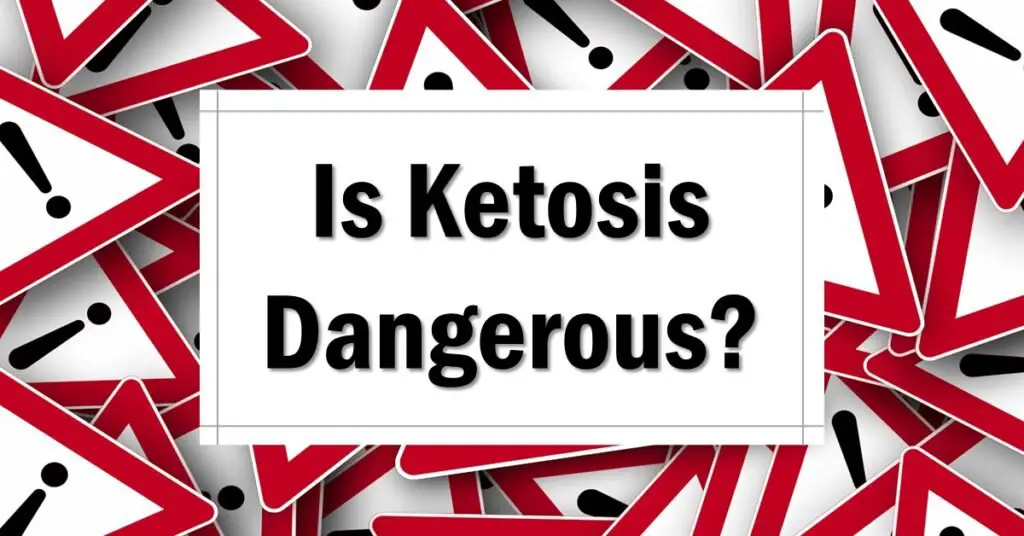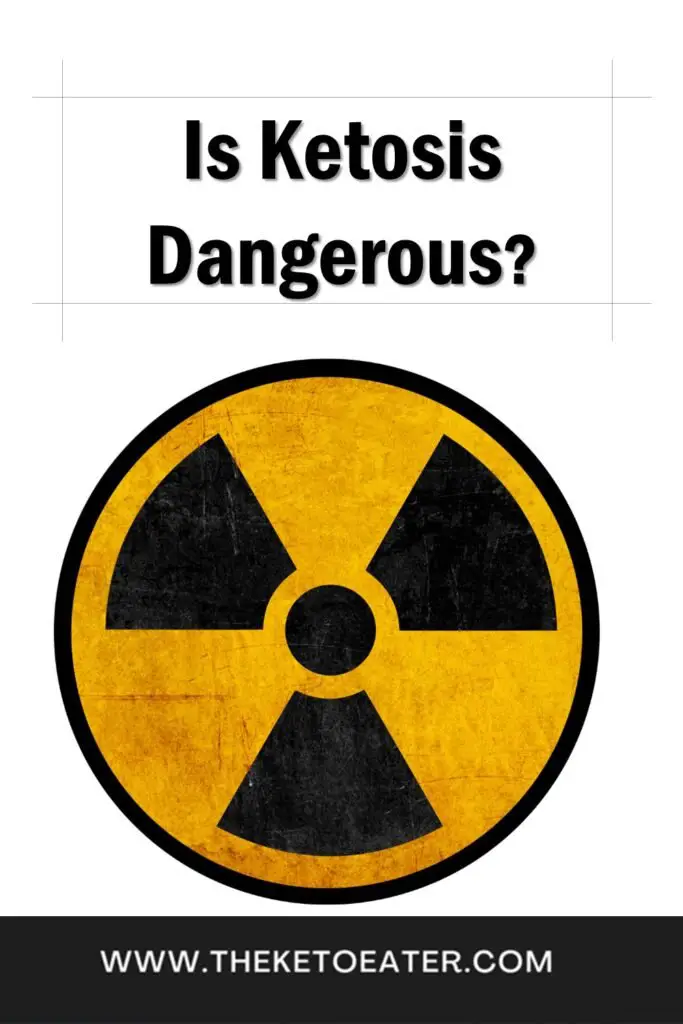Dr. Russell Wilder from Mayo Clinic introduced the ketogenic diet in 1924 as a treatment for epilepsy. It lost popularity after introducing anticonvulsant drugs in the 1920s and 1930s. So, can ketosis be dangerous? SPOILER ALERT: Yes and no. Ketosis can be dangerous, but when entered into the context of the keto diet, when consuming a healthy, balanced diet, ketosis is not dangerous. We explain it all below.
Disclosure: Some of the links in this article may be affiliate links, meaning that we may earn a small commission if you click through using our link and make a purchase. Please be assured that this will not cost you any extra money. Also, please be assured that we either use the products we recommend personally, or have been recommended by trusted friends who currently use them.
Where Does Ketosis Fit Within Keto?
If you’re new to keto and want a bit more information, check out our keto beginners guide.
As a quick summary, if you need it, the keto (also known as the ketogenic diet) is a low-carb, high-fat diet (LCHF).
The whole concept of the keto diet is that your body transitions from burning glucose, in simple terms, sugars or carbohydrates, to burning fat as its primary fuel source.
For a keto diet, people will restrict their macros to eating;
- 70% of their calories are from fat
- 25% from protein
- 5% from carbohydrates
Sticking to these macros for a period of time will put your body into a state of ketosis. Ketosis is when your body has transitioned from burning carbohydrates as its primary fuel source to burning fat for fuel. It is at this point that you will start to see and feel the benefits of the keto diet.
It is the role of the liver to convert amino acids into small amounts of glucose. This process is called glucogenesis. This is when ketone bodies (ketones) are created.

Eventually, your body will become what is known as ‘fat adapted‘. In simple terms, this means that your body is accustomed to burning fat as its primary fuel source and it will function this way as its default setting.
There are a lot of new terms and abbreviations that you may come across, sometimes it can feel like a new language that you need to learn. In order to help you out and keep you on the right track, we have created a keto terms and keto abbreviations guide, bookmark these to make your keto journey easier.
Some people can be put off the keto diet because of the side effects, however, these are only short-lived and the health benefits of keto far outweigh the side effects.
There is no doubt that the process of getting into ketosis and remaining there is a massive change to the way your body is used to functioning.
Supplements may be able to assist your body with this transition and speed up your journey to your health goals.
Some health experts strongly advise against ketosis, citing negative side effects and potential health hazards. We will go through some of these arguments and break them down below.
So, can ketosis be dangerous?

Are Ketosis And Ketoacidosis The Same Thing?
Although both ketosis and ketoacidosis cause the body’s ketone levels to rise, they are not the same thing.
Ketoacidosis is more commonly known as diabetic ketoacidosis. It can be a life-threatening condition brought on by extremely high blood sugar and ketones. However, if treatable.
Ketosis happens when the body makes ketones. It is not that unsafe for your body. You could be in ketosis if you’re on a low-carbohydrate diet, or, have been fasting for a long time.
Can Ketosis Be Dangerous?
Ketosis is a natural state in the body, it is how humans used to live years ago, before bread and processed foods (which are where the majority of sugars come from) ever existed. Originally a caveman’s diet would have been high in protein and leafy greens.
Ketosis becomes dangerous if you are diabetic and ketones are left to build up in your body. This can lead to a build-up of acid, which can lead to a coma and even death.
Can Ketosis Kill You?
Overdosing on practically everything, including proteins, can be dangerous, especially for long-term keto dieters.
At the time of writing, there have been no deaths linked to being on the keto diet, and therefore in nutritional ketosis because of that.
Can Ketosis Cause Dizziness?
Being on a keto diet, and likely in the state of ketosis will drastically lower blood sugar levels. If this is done quickly, this could cause dizziness.
Vitamin-B insufficiency may also cause such symptoms. Therefore, you should boost your Vitamin-B consumption on the keto diet.
Can Ketosis Cause Kidney Pain?
Kidney stones are hard mineral and salt deposits that occur in the urinary canal and can be painful. Ketogenic diets can cause kidney stones, which form due to high meat protein intake.
A high-meat-protein diet can cause your body to excrete too much salt, calcium, and potassium. It can cause low blood pressure, which is another additional kidney strain.
That’s why it is essential to track your macros and ensure that you are getting enough vitamins and minerals on the keto diet, to keep your body functioning at its optimum.
Not eating a balanced diet is not something unique to the keto diet, very few people are actually eating a balanced diet, which includes the right amount of vitamins and minerals.
Can Ketosis Give You Diarrhea?
An imbalance arises if you eliminate certain food categories from your diet. In ketosis, instead of carbohydrates, our bodies burn fat for energy as the body’s primary food source.
Changes in the digestive system might occur due to the diet. And this can result in GI issues, including diarrhea and constipation. Thankfully, if you experience this, it is only normally short-lived whilst your body transitions into ketosis.
Can Ketosis Cause Headaches?
Many people have side effects when they first begin the diet. The most common symptom is headaches.
It could happen as a result of eating fewer carbs, particularly sugar. Dehydration and electrolyte abnormalities can also cause headaches.
This can be avoided by ensuring that you are well hydrated, and some people will add a pinch of pink Himalayan salt to your water to try and prevent dehydration.
Also, check out this article on how much water you should be drinking on a keto diet.
Can Ketosis Lead To Ketoacidosis?
The ketones produced then become the alternative to glucose as a fuel source.
In certain situations, ketosis can develop into ketoacidosis. This causes a decrease in pH and serum bicarbonate levels in the body, which can lead to serious illness.
It should be stressed that reports of this are rare.
Ketosis Can Lead To Metabolic Acidosis [True or False]
When the body produces too much acid, metabolic acidosis develops. It can also occur if the kidneys cannot eliminate sufficient acid from the body.
Studies show that long-term keto diet intake might cause metabolic acidosis, anemia, and decreased plasma antioxidant enzyme levels despite weight loss, low blood sugar, and high blood ketone levels.
Again, this is rare.
Ketosis vs Ketogenesis
Ketosis and ketogenesis are two methods through which cells produce energy. Ketosis is a metabolic condition characterized by high ketone body levels in the blood or urine. Ketogenesis is the breakdown of fatty acids and ketogenic amino acids by living organisms to produce ketones.
Ketosis is a physiological state marked by increased serum ketones and normal blood glucose levels caused by low-carbohydrate diets or fasting. It can have various health benefits, including fewer seizures in children with epilepsy.
Ketogenesis is a metabolic process that occurs in the body. Our body generates ketones when the organisms break down fatty acids and ketogenic amino acids.
Insufficient gluconeogenesis causes excessive ketogenesis and hypoglycemia. Non-diabetic ketoacidosis is a life-threatening condition that results from this.
Why Ketosis Is Good
- When you follow a low-carb diet, your appetite naturally decreases, causing weight loss.
- Low-carb diets help the body rid itself of excess water, decreasing insulin levels and quick weight loss.
- Inflammation and insulin resistance connects to excess fat accumulation collected around the organs. It will lower the risk of heart type-2 diabetes considerably over time.
- Low-carb diets help to lower blood pressure, which is a risk factor for heart disease, stroke, and renal failure, among other things.
- A low-carb diet helps treat symptoms of metabolic syndrome, including obesity, diabetes, and high blood pressure.
- Eating fewer carbs will help your heart.
- The ketogenic diet has treated epilepsy in children for decades.
Ketosis With Intermittent Fasting
The keto diet and intermittent fasting have become popular in recent years. Even though both have substantial proof to back up their claims, many wonder if it’s safe and effective.
When your body runs out of glucose, it goes into ketosis and starts burning the fat it has stored. After merely 12 hours of fasting, your body may enter ketosis, which many people do overnight before eating breakfast.
Intermittent fasting can help you achieve new heights in your keto diet. It’s a logical progression from a keto diet for those who aren’t bothered by their eating window closing and are satisfied by consuming so much fat.
Intermittent fasting might help your body go into ketosis sooner than just practicing the keto diet. Fasting causes your body’s insulin levels and glycogen stores to plummet, causing it to use fat for fuel.
Studies have indicated that intermittent fasting aids weight loss by reducing hunger and enhancing feelings of fullness. You may attain ketosis faster if you combine the keto diet with intermittent fasting than eating a ketogenic diet.
So, is ketosis dangerous? Yes, it can be, however, dietary ketosis as a result of a well-balanced keto diet is unlikely to cause concern for the vast majority of people.
If having read all of that, you’re not sure that keto is for you, why not try low carb instead?


![Keto Rash Explained [Plus How to Treat a Keto Rash] 4 what-is-keto-rash-and-how-to-get-rid-of-it](https://theketoeater.com/wp-content/uploads/2022/04/what-is-keto-rash-and-how-to-get-rid-of-it-150x150.jpg)